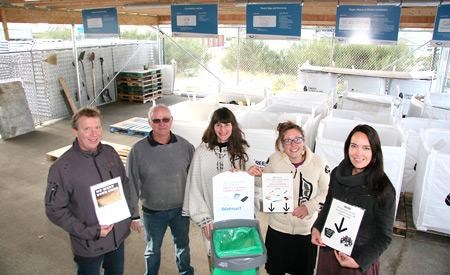Presentations promoting zero waste were littered with great ideas during an afternoon forum dedicated to being kind to the Powell River area’s environment.
About 80 people attended the forum at Evergreen Theatre, Powell River Recreation Complex, which outlined a variety of initiatives designed to keep refuse out of landfills and incinerators.
“We are on a journey to zero waste, from backyard composting, to reducing what we consume, to using recycled containers, to buying bulk items,” said Tai Uhlmann, a member of Let’s Talk Trash team. The team took the coordinating role in the educational session. “These are all steps along the way to zero waste.”
The Let’s Talk Trash team is contracted through Powell River Regional District to offer waste management education for Powell River-area residents. Also participating in the forum were representatives from the regional district, City of Powell River, plus several business owners who have adopted conservation measures in their entrepreneurial endeavours.
Uhlmann said Powell River has the potential and opportunity to become a beacon for zero waste and it will require everyone’s vision and ideas to get there. She outlined what zero waste means and reasons why the community would want to embrace it.
“Let’s Talk Trash has adopted the Zero Waste International Alliance (ZWIA) definition, which does not allow for burying or burning,” she said.
Uhlmann read the ZWIA definition: “Zero waste is a goal that is ethical, economical, efficient and visionary, to guide people in changing their lifestyles and practices to emulate sustainable natural cycles, where all discarded materials are designed to become resources for others to use.
“Zero waste means designing and managing products and processes to systematically avoid and eliminate the volume and toxicity of waste and materials, conserve and recover all resources, and not burn or bury them.”
Inger-Lise Burns, another Let’s Talk Trash team member, said in terms of zero waste, the team’s first focus is avoiding waste creation, followed by reducing it, reusing, recycling and finally, disposing.
She said a term that is coming to the fore is upcycling. These are products where the value or functionality of raw materials has been increased. Combining components of clothes with holes in them to make a functional garment, rather than throwing the material out, would be an example. She also showed slides of pop can lids that had been turned into purses that sell for many times the value of the components, plus children’s toys made from the cans.
Abby McLennan from Let’s Talk Trash spoke about food waste diversion. She said garbage, nationally, is typically composed of 40 per cent organics. In the developed world, a lot of food is wasted, she added, in the order of magnitude of one-third of all food produced, or, 1.3 billion tonnes.
Buried food waste creates methane gas, which is harmful to the atmosphere. McLennan said there is a two-fold imperative to get food out of the landfill, because of the volume that would not be buried and the reduction of greenhouse gas emissions.
Organics diversion is a trend in waste management. McLennan said she is encouraging Powell River-area residents to jump on the bandwagon. She said Augusta Recyclers have taken a proactive approach and will be starting an organics pilot project on Monday, December 8. There will be a collection bin for food waste set up at Augusta’s site.
Mike Wall, manager of community services for the regional district, said he is currently looking at two landfill closures in this region. He’s had the opportunity to have a look at a resource recovery site in Ladysmith, BC. That community faced similar challenges to Powell River, with an old incinerator site that required closure.
Ladysmith, in fact, recycled the site, reclaiming part of the old incinerator building to create a covered area for parts of the program. At the facility, there are currently 680 items that are recycled, Wall said, which is “pretty amazing.”
He said preliminary concept plans have been created for a recovery park in Powell River and community feedback will be sought. “It would provide for closure of a landfill, and partnerships with further remediation through association with the botanical garden society, possibly. It would provide for educational opportunities, resource recovery, upcycling and reuse opportunities, plus recycling.”
McLennan said establishment of a recovery park is the dream of the Let’s Talk Trash team.
Those attending the forum also heard presentations from Jill Doucette, of Synergy Enterprises, a Vancouver Island-based company. Her mission is to work at catalyzing a green economy.
Melissa Call, owner of Ecossentials Food and Grocery, outlined her business practices and work to embrace a zero-waste philosophy.
There was also a presentation from Chloe Smith, general manager of Townsite Brewing, and Guadalupe Dufour, from A Perfect Fit Sewing, who have combined to convert trash to treasure. Smith supplies expended barley sacks and Dufour turns them into garments and other products, such as grocery bags and backpacks.
For more information on zero waste and recycling, the Let’s Talk Trash team can be contacted at 604.483.3231 and [email protected].



